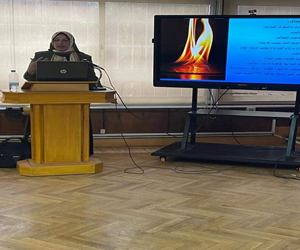A symposium entitled "Global Warming and Green Hydrogen... The Future of the World" at the Faculty of Girls
The Faculty of Girls at Ain Shams University, in cooperation with the Department of Geography, organized under the auspices of Prof. and Environmental Development, a symposium entitled "Global Warming and Green Hydrogen, the Future of the World", which was conducted by Dr. Nashwa Maghribi, a teacher of climatic geography at the Department of Geography, Faculty of Girls
 |
 |
 |
||
It included each of the following topics:
✓ The concept of global warming
✓ Causes of contemporary global warming
✓ Greenhouse gases and warming countries
✓ Temperature rise scenarios and trend index
✓ Outcomes of global warming
✓ International Agreements on Climate Change
✓ Solutions and proposals to counter global warming
✓ Hydrogen, the green future (concept, types, uses)
✓ The most important conclusions to come out of the COP27 climate conference
A large number of faculty staff from the Department of Geography and other departments and a large number of students from the Department of Geography at the faculty attended.
Dr. Nashwa concluded the symposium with some important recommendations, as follows:
Recommendations:
• We recommend the conclusion and follow-up of international agreements to limit global warming
• The fulfillment of world leaders of their pledges to combat global warming and the use of new and renewable energy
• We recommend setting penalty conditions for factories that do not use the natural environment resources from clean energy in order to reduce emissions from chemical industries.
• Please use low-carbon biofuels to travel long distances without polluting the atmosphere.
• The necessity of supporting companies to use green hydrogen in developing the energy system used in the fields of industry, transportation, agriculture, housing, mining, and other activities, in order to combat global warming and climate change.
• We recommend collecting and exchanging information on greenhouse gas emissions and following best practices
• Financial and technological support for developing countries must be improved to address greenhouse gas emissions and adapt to the impacts.
• Obliging everyone to cooperate internationally in mitigation and adaptation to the effects of climate change
• Please stimulate the expansion of green hydrogen use so that clean hydrogen meets 22% of global energy needs by 2050
.svg)




